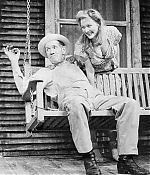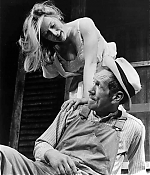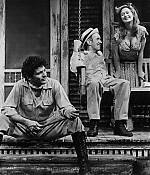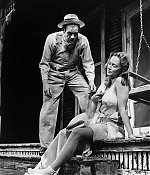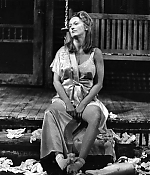|
Simply Streep is your premiere source on Meryl Streep's work on film, television and in the theatre - a career that has won her the praise to be one of the world's greatest working actresses. Created in 1999, we have built an extensive collection to discover Miss Streep's body of work through articles, photos and videos. Enjoy your stay.
|
Celebrating
25 years
of SimplyStreep
|
27 Wagons Full of Cotton
January 26, 1976 - March 21, 1976
· The Phoenix Theatre
|

In his autobiography, actor John Lithgow fondly remembered Meryl Streep’s audition for “27 Wagons Full Of Cotton”: “Of the three shows being produced, one was an evening of two one-acts that included Tennessee Williams’ 27 Wagons Full of Cotton. This was the three-character play from 1955 that eventually evolved into the notorious film Baby Doll. The one-act was to be directed by my old Long Wharf boss Arvin Brown. He needed to find a sensational young actress to play the bravura role of the voluptuous, dim-witted Baby Doll. Word had gotten around about the terrific young Yale Drama School girl who had fared so well in Trelawny of the “Wells” at Lincoln Center. She was called in to read for the part. Since I was one of the four Phoenix directors that season, I was there for her audition. When she walked in, I greeted her warmly, introduced her to the other three directors, then sat down beside them behind a table and witnessed a little piece of theater history. For her audition she wore a nondescript skirt, blouse, and slip-on shoes. She carried a second pair of shoes and a box of Kleenex. As she made small talk with Arvin about the play and the character, she unpinned her hair, she changed her shoes, she pulled out the shirttails of her blouse, and she began casually stuffing Kleenex into her brassiere, doubling the size of her bust. Reading with an assistant stage manager, she began a scene from 27 Wagons Full of Cotton. You could barely detect the moment when she slipped out of her own character and into the character of Baby Doll, but the transformation was complete and breathtaking. She was funny, sexy, teasing, brainless, vulnerable, and sad, with all the colors shifting like mercury before our eyes. From the first second there was no question that she would be offered the part, so the four of us just sat there and enjoyed her performance. She was hired. She played Baby Doll. She was the talk of the town. She was nominated for a Tony Award for best featured actress in a play. This was the first of at least thirty major award nominations she would eventually receive. Nobody would argue with the statement that she is the greatest American actress of the last fifty years. A moment of history? Of course. It was the last time Meryl Streep had to audition for anything.”
Meryl Streep herself remembered working on “27 Wagons full of Cotton” in a 1979 interview with Ms. Magazine: It was a great showcase for an actress (to perform two roles on night night in “27 Wagons full of Cotton” and “A Memory of Two Mondays”). In one play, I was very fat; I had all kinds of padding and prosthetic breasts. In the other, I was a completely different person. What the people saw fed into what I wanted for myself – which was not to be typed”.
Meryl Streep as Baby Doll is amazing: a tall, well-upholstered, Rubenesque child-woman; a sexy Baby Snooks, tottering around on dingy cream-colored high-heeled shoes, giggling, chattering in her little-girl voice, alternately husky and shrill, mouthing her words as if too lazy to pronounce them properly (and yet you can understand every word), tonguing her lips, smiling wet smiles, playing with her long blonde hair, cuddling her boobs in her arms, lolling and luxuriating in her body as if it were a warm bath. And all this extravagant detail is as spontaneous and organic as it is abundant; nothing is excessive; nothing is distracting; everything is part of Baby Doll. What a performance!
★ Kansas City Star’s Joseph Kay Award – Best Featured Actress
★ Outer Critics Circle Award – Best Featured Actress
★ World Theatre Award – Best Featured Actress
☆ Drama Desk Award – Outstanding Actress in a Play
☆ Tony Award – Best Featured Actress

